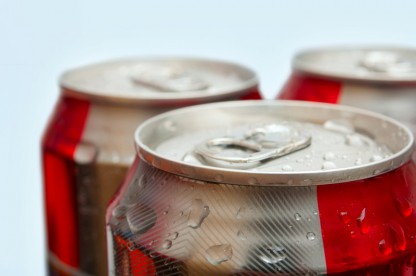The Diet Soda/Weight Gain Link: How Artificial Sweeteners Are Messing with Your Metabolism
 The evidence for a direct diet soda/weight gain link just got even stronger—and it’s fascinating. Proof that artificial sweeteners actually harm, rather than help, the obesity crisis, has been mounting for some time. A new study in Nature presents compelling evidence that artificial sweeteners like those found in diet soda interfere with our friendly gut bacteria, leading to higher blood sugar. This may be the primary way in which artificial sweeteners like aspartame and sucralose contribute to weight gain and the obesity epidemic.
The evidence for a direct diet soda/weight gain link just got even stronger—and it’s fascinating. Proof that artificial sweeteners actually harm, rather than help, the obesity crisis, has been mounting for some time. A new study in Nature presents compelling evidence that artificial sweeteners like those found in diet soda interfere with our friendly gut bacteria, leading to higher blood sugar. This may be the primary way in which artificial sweeteners like aspartame and sucralose contribute to weight gain and the obesity epidemic.
For years we were taught that zero-calorie artificial sweeteners help curb weight gain. But evidence has been mounting that they do just the opposite. Is there really a diet soda/weight gain link? And if so, why? Is it simply because, as some people suggest, artificially sweetened drinks make it seem like we’re “saving” calories and so we feel free to eat more food in general? Or is it more complex than that? A team of researchers devised a series of studies in mice and men to find out.
Artificial sweeteners increase glucose and alter gut bacteria in mice
The team first put one of three artificial sweeteners– saccharin, sucralose, or aspartame – in the drinking water of mice. Their blood sugar levels rose significantly compared to mice which drank either plain water or sugar water. Specifically, these mice developed marked “glucose intolerance,” the pre-diabetic state in which blood sugar levels become abnormally high after meals. Glucose intolerance is well-known to put you at risk of eventually developing type 2 diabetes. It also puts you at risk of developing heart disease, even if you don’t develop diabetes.
That’s troubling, but even more disturbing is what happened when the researchers transplanted the gut bacteria of the mice consuming artificial sweeteners into other mice: they (the recipient mice) developed glucose intolerance, too. The artificial sweeteners were causing glucose intolerance by altering their microbiome—replacing the normally healthy balance of intestinal microflora with an abnormal, unhealthy mix of microbes. In fact, when the types of gut bacteria were analyzed, the team found overgrowths of bacteria with known links to obesity and diabetes.
Diet soda causes glucose intolerance and gut dysbiosis in humans too
Even more convincing is what the researchers found when they looked at human subjects. First, they compared people who don’t consume artificial sweeteners to those who do and found that regular consumers of artificial sweeteners had markedly different gut bacteria. Next, the researchers had the people who don’t consume artificial sweeteners do so for one week. In that short amount of time, half of them developed glucose intolerance and had increases in the gut microbes linked to glucose intolerance.
It’s known that most artificial sweeteners pass through the gastrointestinal tract without being digested, and thus directly encounter our trillions of intestinal microbes. However, it is not understood exactly how these sweeteners interfere with our friendly gut bacteria and lead to glucose intolerance in some people. The study’s authors speculate that inflammation plays a role, with altered populations of gut bacteria triggering inflammation, which then goes on to cause dysfunctional blood sugar regulation. It may be that certain people—or their gut bacteria—are more susceptible to the inflammatory effects of artificial sweeteners.
More reasons to quit diet drinks
Don’t fall victim to weight gain from diet soda consumption. Keep artificial sweeteners from altering your microbiome and your metabolism by staying away from sucralose, aspartame, and other artificial sweeteners. Whether you decide to quit cold turkey or gradually reduce your consumption of sodas and other artificially sweetened beverages, your best bet is to replace sweet drinks with pure, filtered water and unsweetened herbal or green tea. Stay away from sweetened beverages and before too long you will have re-trained your brain and taste buds so that you no longer crave them, especially those sweetened with artificial sweeteners. In fact, you will find that artificially sweetened drinks taste like what they are: chemicals. Besides helping to stave off diabetes and obesity, you’ll also be doing your brain a favor. As I wrote about last year, research shows that drinking artificially sweetened beverages also increases your risk for depression.
Nature. 2014 Sep 17. doi: 10.1038/nature13793. [Epub ahead of print]


 Ask the EN Experts March 2025
Ask the EN Experts March 2025  Vegan Diet Better Than Omnivore Diet for Cardiovascular Health
Vegan Diet Better Than Omnivore Diet for Cardiovascular Health 